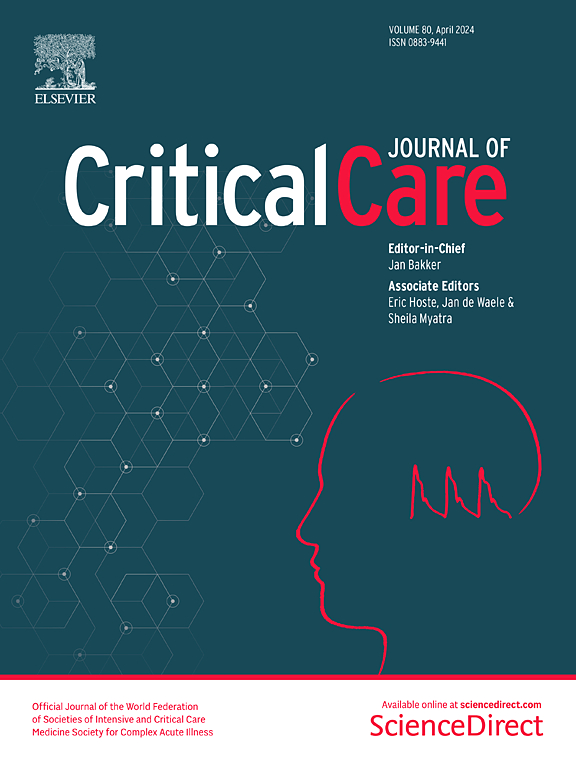成人体外膜氧合患者的神经监测和管理:体外生命支持组织共识指南
IF 8.8
1区 医学
Q1 CRITICAL CARE MEDICINE
引用次数: 0
摘要
对急性脑损伤(ABI)体外膜氧合(ECMO)患者的重症监护因缺乏高质量的临床证据而备受关注。在此,我们为成人在 ECMO 支持期间和之后的神经护理(神经监测和管理)提供指南。这些指南基于临床实践共识建议和科学声明。我们召集了一个国际多学科共识小组,其中包括来自体外生命支持组织(ELSO)所有分会的 30 名具有 ECMO 专业知识的临床科学家。我们采用了改良的德尔菲程序,进行了三轮投票,并要求专家小组成员对建议级别进行评估。我们确定了五个需要指导的关键临床领域:(1) 神经系统监测;(2) 箝位后早期生理目标和 ABI;(3) 神经系统治疗,包括药物和手术干预;(4) 神经系统预后;(5) 神经系统随访和结果。共识就关键临床领域提出了 30 项声明和建议。我们发现了一些知识空白,以便为今后的研究工作提供参考。ABI 对 ECMO 患者的发病率和死亡率影响重大。特别是,早期发现和及时干预对改善预后至关重要。这些共识建议和科学声明将为 ABI 的神经监测和预防以及 ECMO 相关 ABI 的管理策略提供指导。本文章由计算机程序翻译,如有差异,请以英文原文为准。
Neurological monitoring and management for adult extracorporeal membrane oxygenation patients: Extracorporeal Life Support Organization consensus guidelines
Critical care of patients on extracorporeal membrane oxygenation (ECMO) with acute brain injury (ABI) is notable for a lack of high-quality clinical evidence. Here, we offer guidelines for neurological care (neurological monitoring and management) of adults during and after ECMO support. These guidelines are based on clinical practice consensus recommendations and scientific statements. We convened an international multidisciplinary consensus panel including 30 clinician-scientists with expertise in ECMO from all chapters of the Extracorporeal Life Support Organization (ELSO). We used a modified Delphi process with three rounds of voting and asked panelists to assess the recommendation levels. We identified five key clinical areas needing guidance: (1) neurological monitoring, (2) post-cannulation early physiological targets and ABI, (3) neurological therapy including medical and surgical intervention, (4) neurological prognostication, and (5) neurological follow-up and outcomes. The consensus produced 30 statements and recommendations regarding key clinical areas. We identified several knowledge gaps to shape future research efforts. The impact of ABI on morbidity and mortality in ECMO patients is significant. Particularly, early detection and timely intervention are crucial for improving outcomes. These consensus recommendations and scientific statements serve to guide the neurological monitoring and prevention of ABI, and management strategy of ECMO-associated ABI.
求助全文
通过发布文献求助,成功后即可免费获取论文全文。
去求助
来源期刊

Critical Care
医学-危重病医学
CiteScore
20.60
自引率
3.30%
发文量
348
审稿时长
1.5 months
期刊介绍:
Critical Care is an esteemed international medical journal that undergoes a rigorous peer-review process to maintain its high quality standards. Its primary objective is to enhance the healthcare services offered to critically ill patients. To achieve this, the journal focuses on gathering, exchanging, disseminating, and endorsing evidence-based information that is highly relevant to intensivists. By doing so, Critical Care seeks to provide a thorough and inclusive examination of the intensive care field.
 求助内容:
求助内容: 应助结果提醒方式:
应助结果提醒方式:


